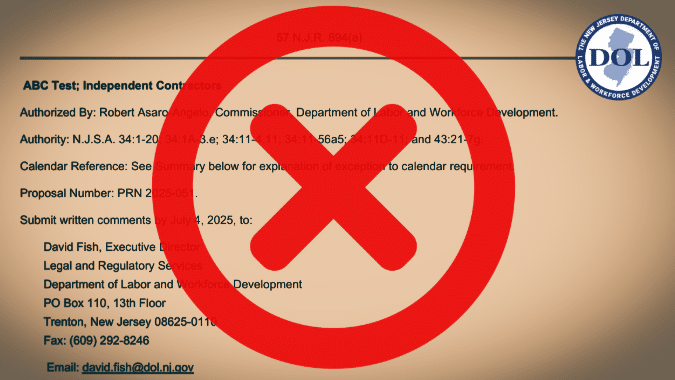The New Jersey Department of Labor & Workforce Development this week uploaded all written public comments regarding its controversial rule proposal that would drastically reduce the number of independent contractors.
Following the pattern of NJDOL’s in-person testimony on June 23, an overwhelming majority of the 11,688 pages of comments, represented by a wide array of worker and business interests, strongly opposed the proposal. Additionally, the minority of supporters were mostly labor groups.
Here are just some of the more noteworthy comments and items found within the 161 MB file, which can be downloaded here under the Rule Proposal and 2025 Notices of Proposal tabs.
Inside Job
One letter opposing the NJDOL rule proposal had Gov. Phil Murphy’s name and the New Jersey State Seal on the letterhead.
It was filed by New Jersey Office of the Public Defender First Defender Robyn Veasey, which cited that the office “relies heavily on the services of ‘pool attorneys,’ highly qualified independent contractors who provide constitutionally required legal representation to indigent clients throughout the state.’
Veasey wrote that many independent professional attorneys could be misclassified as state employees and the rules “risk undermining access to justice.”
“If pool attorneys must be reclassified, OPD’s ability to maintain an adequate defense capacity will be compromised,” Veasey wrote. “Court calendars will be delayed, clients will wait longer for representation, and constitutional mandates will be jeopardized, all because of a regulatory framework that fails to account for the distinct and regulated nature of legal practice.”
More Lawmakers Concerns
While they didn’t speak holistically about concerns of the rule like 22 other Democrat and Republican legislators, Sens. Paul Sarlo and Benjie Wimberly both urged NJDOL to include an exemption from the rule for financial professionals.
Logistical Nightmare
One of the most compelling testimonies came from Association of Bi-State Motor Carriers President Lisa Yakomin.
In addition to telling NJDOL and Gov. Phil Murphy to step back from a 2019 Misclassification Task Force report based on its lack of transparency and to heed the “impassioned warnings” from legislators to unite against the proposal, Yakomin, in her 21-page letter, quoted members on how the elimination of owner-operator drivers would impact their ability to move freight at the Port of NY & NJ.
Those quotes included the following:
“If Independent Owner Operators (O/Os) are eliminated under the proposed ABC rule, the drayage capacity at the Port of NY & NJ will be devastated overnight. With up to 77% of the port trucking workforce classified as O/Os, this isn’t just a labor shift —it’s a systemic collapse in the making.”
“From my 25 years of experience in logistics and drayage dispatch, I can say without hesitation that the immediate impact would be a minimum 50% reduction in available drivers. The ripple effects would include skyrocketing rates, freight delays, severe chassis shortages, yard congestion, and an overwhelming strain on the limited pool of company drivers. Small and mid-sized carriers will struggle to survive, and larger carriers will not have the flexibility to absorb the volume.”
“This rule, if passed, won’t protect workers—it will paralyze the supply chain. We need regulatory frameworks that support safety, accountability, and fairness, but this proposal throws the baby out with the bathwater. The long-term damage to port productivity, regional commerce, and customer confidence will be irreversible.”
“Very few of our owner-operators have any desire to become company drivers. Many of these owner operators have been with us for years, they like their independence and the model works for them. When we added company trucks, none of the owner operators took those positions, they wanted to keep their independent status.”
Dashers Rise Up
More than 1,000 independent contractors who provide services for DoorDash – self-referred to as “Dashers” – pleaded with NJDOL to reconsider the proposal.
Some of the language of those letters included the following: “Delivering with DoorDash as a Dasher lets me get access to work in a way that fits into my life. Being an independent contractor means I get to be my own boss. I get to choose when, where, and how I want to work, which allows me to use dashing in the way that works best for me.
“This rule threatens that flexibility by targeting my work and risking making it harder for people like me to choose to work independently.
“If this rule goes through, it could risk forcing this job under rigid employment rules that don’t work for me. I’d have less control over my work, making it harder to get the extra income I rely on.”
The were also multiple comments opposing the rule from rideshare service Lyft.
